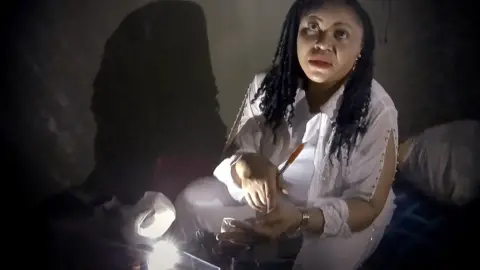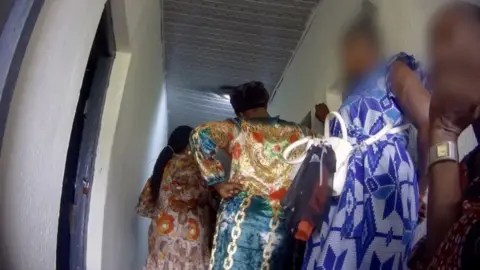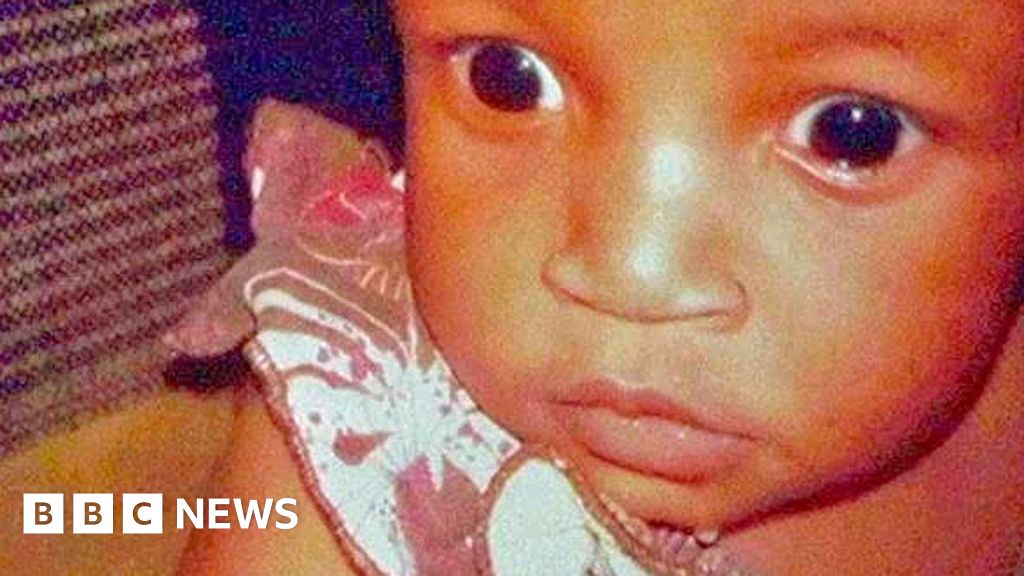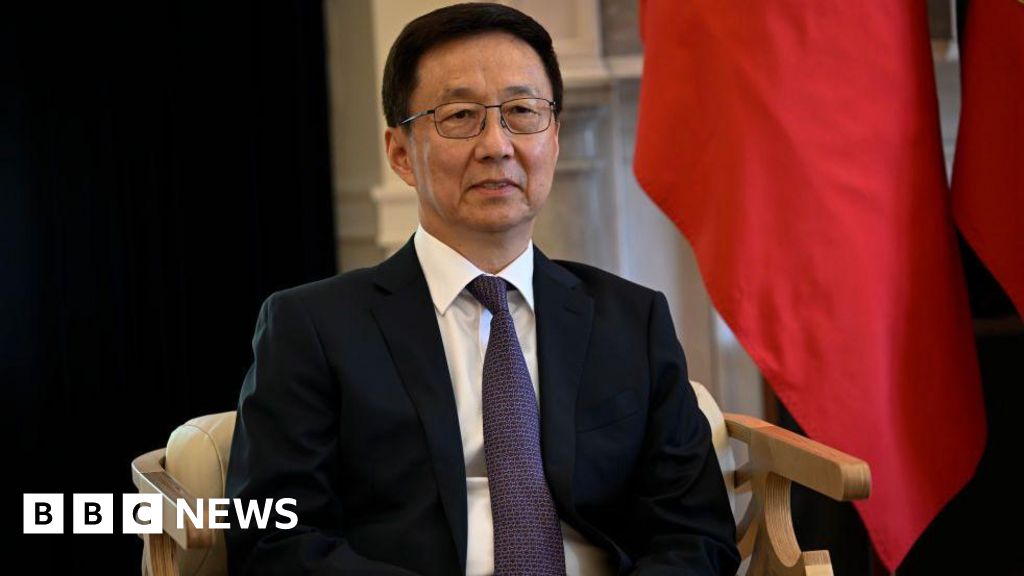ARTICLE AD BOX

 BBC
BBC
Chioma is adamant that baby Hope is her son
Chioma is adamant that Hope, the baby boy she is holding in her arms, is her son. After eight years of failed attempts to conceive, she sees him as her miracle baby.
“I’m the owner of my baby,” she says defiantly.
She’s sitting next to her husband, Ike, in the office of a Nigerian state official who spends the best part of an hour interrogating the couple.
As the commissioner for women affairs and social welfare in Anambra state, Ify Obinabo has plenty of experience in resolving family disputes - but this is no ordinary disagreement.
Five members of Ike’s family, who are also present in the room, do not believe Hope is the couple’s biological child, as Chioma and Ike claim.
Chioma claims to have “carried” the child for about 15 months. The commissioner and Ike’s family are in disbelief at the absurdity of the claim.
Chioma says she faced pressure from Ike’s family to conceive. They even asked him to marry another woman.
In her desperation, she visited a “clinic” offering an unconventional “treatment” - an outlandish and disturbing scam preying on women desperate to become mothers that involves the trafficking of babies.
The BBC was allowed by authorities to sit in on the commissioner's discussion with Chioma as part of our investigation into the cryptic pregnancy scam.
We have changed the names of Chioma, Ike and others in this article to protect them from reprisal in their communities.


State commissioner Ify Obinabo is trying to crack down on the scam
Nigeria has one of the highest birth rates in the world, with women often facing social pressure to conceive and even ostracisation or abuse if they cannot.
Under this pressure, some women go to extremes to realise their dream of motherhood.
For over a year, BBC Africa Eye has been investigating the “cryptic pregnancy” scam.
Scammers posing as doctors or nurses convince women that they have a “miracle fertility treatment” guaranteed to get them pregnant. The initial “treatment” usually costs hundreds of dollars and consists of an injection, a drink, or a substance inserted into the vagina.
None of the women or officials we spoke to during our investigation know for sure what is in these drugs. But some women have told us they led to changes in their bodies - such as swollen stomachs - which further convinced them they were pregnant.
Women given the “treatment” are warned not to visit any conventional doctors or hospitals, as no scan or pregnancy test would detect “the baby”, which the scammers claim is growing outside the womb.
When it’s time to “deliver” the baby, women are told labour will only begin once they are induced with a “rare and expensive drug”, requiring further payment.
Accounts of how the “delivery” happens vary, but all are disturbing. Some are sedated only to wake up with a Caesarean-like incision mark. Others say they are given an injection that causes a drowsy, hallucinatory state in which they believe they’re giving birth.
Either way, the women end up with babies they are supposed to have given birth to.
Chioma tells commissioner Obinabo that when her time to “deliver” came, the so-called doctor injected her in the waist and told her to push. She does not spell out how she ended up with Hope, but says the delivery was “painful”.


"Dr Ruth" runs a fake pregnancy clinic in the state of Anambra
Our team manages to infiltrate one of these secretive “clinics” - connecting with a woman known as “Dr Ruth” to her clients - by posing as a couple who have been trying to conceive for eight years.
This so-called "Dr Ruth" runs her clinic every second Saturday of the month in a dilapidated hotel in the town of Ihiala, in the south-eastern Anambra state. Outside her room, dozens of women wait for her in the hotel corridors, some with visibly protruding stomachs.
The whole atmosphere is buzzing with positivity. At one point, huge celebrations erupt inside the room after a woman is told she is pregnant.
When it’s our undercover reporters’ turn to see her, "Dr Ruth" tells them the treatment is guaranteed to work.
She offers the woman an injection, claiming it will enable the couple to “select” the sex of their future baby - a medical impossibility.
After they turn down the injection, "Dr Ruth" hands them a sachet of crushed pills as well as some more pills for them to take at home, along with instructions on when to have intercourse.
This initial treatment costs 350,000 naira ($205; £165).
Our undercover reporter neither takes the drugs nor follows any of "Dr Ruth’s" instructions and returns to see her four weeks later.
After running a device that looks like an ultrasound scanner across our reporter’s stomach, a sound like a heartbeat is heard and "Dr Ruth" congratulates her on being pregnant.
They both cheer with joy.
After delivering the good news, "Dr Ruth" explains how they’ll need to pay for a “scarce” and expensive drug needed for the baby to be born, costing somewhere between 1.5 and two million naira ($1,180; £945).
Without this drug, the pregnancy could extend beyond nine months, "Dr Ruth" claims with disregard for scientific fact, adding: “The baby will become malnourished - we’d need to build it up again.”
"Dr Ruth" has not responded to allegations the BBC has put to her.


Dozens of women were waiting to see "Dr Ruth"
The extent to which the women involved genuinely believe the claims is unclear.
But clues as to why they would be susceptible to such brazen lies can, in part, be found in online groups where disinformation around pregnancy is widespread.
A network of disinformation
Cryptic pregnancy is a recognised medical phenomenon, in which a woman is unaware of her pregnancy until the late stages.
But during our investigation, the BBC found widespread misinformation in Facebook groups and pages about this type of pregnancy.
One woman from the US, who dedicates her entire page to her “cryptic pregnancy", claims to have been pregnant “for years” and that her journey cannot be explained by science.
In closed groups on Facebook, many posts use religious terminology to hail the bogus “treatment” as a “miracle” for those who’ve been unable to conceive.
All of this misinformation helps solidify women’s belief in the scam.
Members of these groups are not only from Nigeria, but also from South Africa, the Caribbean, and the US.
The scammers also sometimes manage, and post in, these groups, enabling them to reach out to women expressing an interest in the "treatment".
Once someone expresses readiness to start the scam process, they are invited into more secure WhatsApp groups. There, admins share information about “cryptic clinics” and what the process involves.
‘I’m still confused’
Authorities tell us that to complete the “treatment”, the scammers need new-born babies and to do that they seek out women who are desperate and vulnerable, many of them young and pregnant, in a country where abortion is illegal.
In February 2024, the Anambra state health ministry raided the facility where Chioma “delivered” Hope.
The BBC obtained footage of the raid, which showed a huge complex made up of two buildings.
In one were rooms containing medical equipment - apparently for clients - while in the other were several pregnant women being kept against their will. Some were as young as 17.
Some tell us they were tricked into going there, unaware their babies would be sold to the scammer’s clients.
Others, like Uju, which is not her real name, felt too scared to tell their family they were pregnant and sought a way out. She said she was offered 800,000 naira ($470; £380) for the baby.
Asked if she regrets her decision to sell her baby, she says: “I’m still confused.”
Commissioner Obinabo, who has been part of efforts in her state to crack down on the scam, says scammers prey on vulnerable women like Uju to source the babies.


Uju would have sold her baby, had authorities not rescued her
At the end of a tense interrogation, commissioner Obinabo threatens to take away baby Hope from Chioma.
But Chioma pleads her case, and the commissioner eventually accepts her explanation that she is a victim herself and that she hadn’t realised what was going on.
On this basis she allows Chioma and Ike to keep the baby - unless the biological parents come forward to claim him.
But unless attitudes towards women, infertility, reproductive rights and adoption change, scams like this will continue to thrive, experts warn.
You can watch the iPlayer documentary here and a YouTube version of this story here.

 1 month ago
12
1 month ago
12








 English (US) ·
English (US) ·